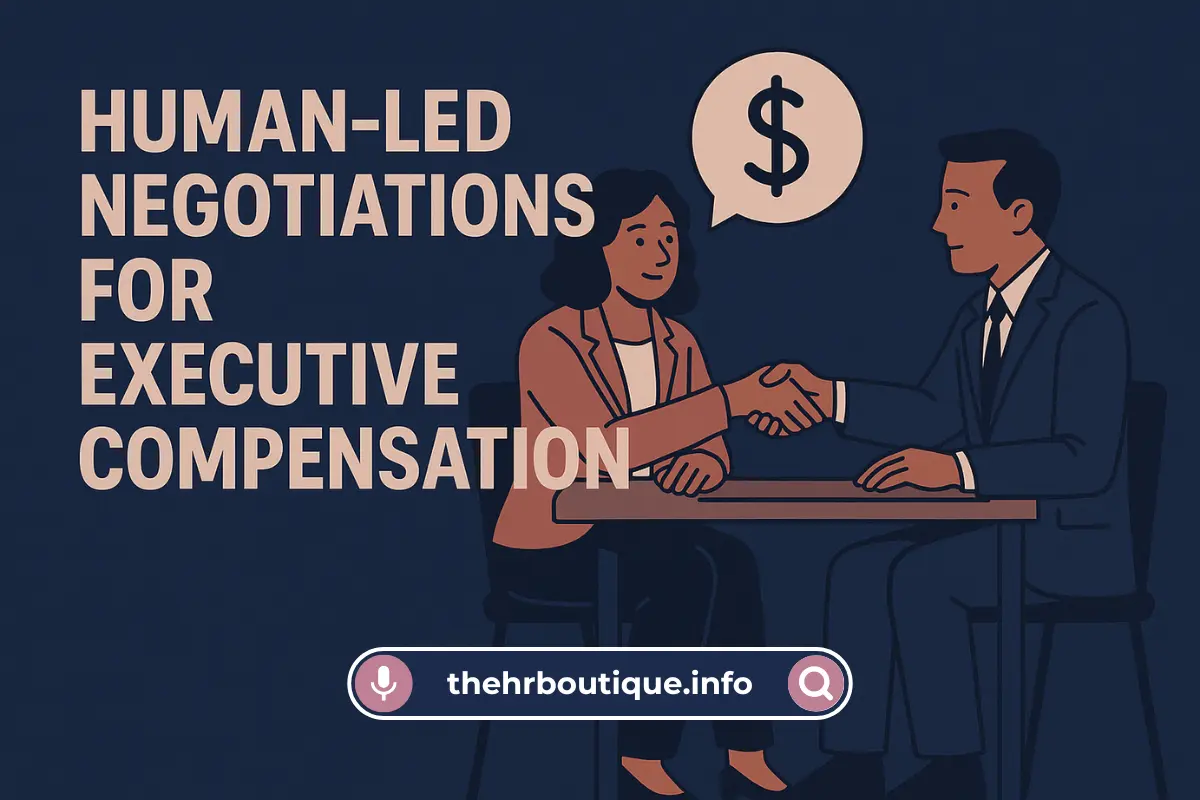Let’s be real – talking about big-money compensation packages can feel awkward. You’re not just negotiating numbers, you’re figuring out how to value someone’s entire career. And that’s way too personal for some cookie-cutter AI approach.
Here’s the truth: the best compensation deals happen when real humans sit down and have real conversations. No corporate jargon. No robotic templates. Just smart people figuring out what works for everyone.
Why Human Negotiations Beat Algorithms Every Time?
Picture this: You’re trying to hire a superstar executive. They’re not just looking at the paycheck – they’re thinking about their legacy, their family, maybe even their ego (we’re all human, right?).
That’s where human negotiation shines:
- We get nuance – Maybe they want more vacation time instead of a bigger bonus. Maybe equity matters more than salary. Only humans can pick up on these cues.
- We build trust – You wouldn’t propose marriage via spreadsheet (I hope). Big career moves need that human connection.
- We can think outside the box – When budgets are tight, creative solutions win. Maybe it’s a phased compensation plan or unique perks.
“The moment compensation talks feel transactional, you’ve already lost. Great executives don’t just want to be paid – they want to be valued.”
The HR Playbook for Stress-Free Executive Negotiations
As an HR pro, you’re the translator between the C-suite and potential hires. Here’s how to keep things smooth:
Before the Meeting
Do your homework like you’re prepping for the world’s most important first date:
- Know their resume cold – What’s their career trajectory? What are they proud of?
- Understand their must-haves – Kids heading to college? Planning an early retirement? These matter.
- Have your numbers ready – But be ready to explain why they’re fair (without sounding like a robot).
During the Chat
This is where you earn your paycheck:
- Listen more than you talk – The best negotiators are detectives, not auctioneers.
- Watch their reactions – That flinch when you mention the bonus structure? That’s gold.
- Be honest about constraints – “I wish we could go higher on base salary, but here’s what we can do instead…”
Breaking Down the Executive Pay Puzzle
Let’s talk turkey. Executive packages aren’t just about salary – they’re like a custom-tailored suit with lots of pieces:
The Basics
- Base salary – The guaranteed money. Usually the least flexible part.
- Short-term bonuses – The “hit these targets, get this reward” money.
The Good Stuff
- Equity/stock options – Where the real wealth happens (if the company does well).
- Deferred compensation – Fancy way of saying “we’ll pay you later to keep you around”.
The Icing on the Cake
- Lifestyle perks – Think company cars, club memberships, or that sweet executive health plan.
- Golden parachutes – The “if this goes south, you’ll be okay” safety net.
When Negotiations Get Sticky (And How to Fix It)
Even the best talks can hit snags. Here’s how to handle common issues:
Problem: They want Silicon Valley money at a Midwest manufacturing company.
Fix: Show them the cost-of-living math. Maybe offer more equity to bridge the gap.
Problem: They’re hung up on title instead of compensation.
Fix: Get creative – “Chief Growth Officer” sounds fancier than “VP of Sales” but might not change the pay scale.
Problem: They keep comparing to their friend’s package at another company.
Fix: “That’s great for them! Let’s focus on what makes sense for your role here.”
Pro Tips From Someone Who’s Been There
After helping negotiate dozens of these deals, here’s what actually works:
- The 24-hour rule – Never give your best offer first. Always sleep on it.
- The walkaway test – Know your absolute limit before you start.
- The family factor – If they mention spouse/kids, you’ve found their real priority.
The Bottom Line
At the end of the day, executive compensation isn’t about winning or losing – it’s about finding that sweet spot where everyone feels good about the deal.
Remember:
- Great talent knows their worth.
- Great companies show they value people.
- Great HR pros make it all happen without anyone feeling icky.
Now go forth and negotiate like the human you are. And maybe keep some chocolate in your desk drawer – these talks can get intense.
What’s the toughest compensation challenge you’ve faced? (I promise I won’t judge if you say “everything” – we’ve all been there.)





